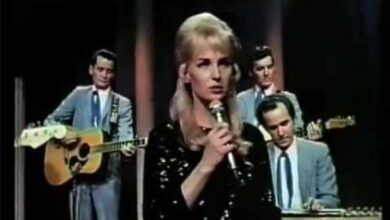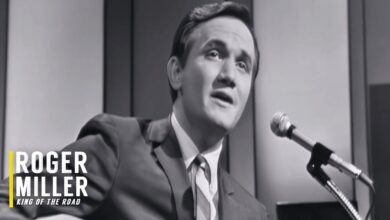“Where No One Stands Alone” is a profoundly emotional gospel song that Elvis Presley included in his repertoire, highlighting his deep-rooted connection to gospel music, which significantly influenced his musical career. This song, in particular, showcases Presley’s spiritual side, an aspect that pervaded much of his life and music. The live recording from his concert in Montgomery, Alabama on February 16, 1977, is particularly notable as it captures one of his final performances before his death in August of that year. The rendition is stripped down to its core, featuring Elvis’s voice accompanied only by piano, emphasizing the raw emotional depth and personal reflection inherent in the lyrics.
The performance in Montgomery is marked by Presley’s resonant and soulful delivery, which was characteristic of his later live performances. His voice, matured yet still powerful, conveys a sense of vulnerability and sincerity that fans often cite as a hallmark of his late career concerts. This song, like many others in his gospel repertoire, provided Elvis with a platform to express his personal struggles and his search for solace through faith. The simplicity of the musical arrangement—just Elvis and a piano—allows his vocal nuances to shine, giving the song a poignant intimacy.
Elvis’s connection to gospel music began in his childhood, growing up in Tupelo, Mississippi, where he was heavily influenced by the gospel music he heard in church and at community gatherings. This genre was a constant throughout his life, not just as a source of inspiration but also as a comfort during times of personal turmoil. His three Grammy Awards were all for gospel recordings, underscoring the significance of this genre in his career.
The concert in Montgomery was part of Presley’s attempt to reconnect with his roots and deliver performances that were more personal and reflective of his inner experiences. Despite his deteriorating health, his commitment to his music and his audience never waned. Fans at the concert reported a palpable sense of Elvis’s commitment to the performance, despite visible signs of physical decline.
“Where No One Stands Alone” talks about the longing for divine support and never being left alone, themes that resonated deeply with Elvis during this period. Lyrics such as “Take my hand, lead me on, help me stand” are a poignant plea for strength and guidance, reflecting his personal vulnerabilities and his reliance on faith to navigate his challenging final years.
This recording is not just a musical performance; it serves as a historical document capturing the twilight of Elvis’s career. It highlights his ability to connect with his audience on a spiritual level, transcending the boundaries of typical rock and roll performances to offer something deeply personal and spiritually resonant.
Offstage, Elvis was known for his generosity and his turbulent personal life, marked by high-profile relationships and a struggle with addiction, which ultimately contributed to his untimely death. Yet, through his music, especially in performances like the one in Montgomery, he sought solace and found a way to communicate his deepest emotions and fears.
The legacy of Elvis Presley is not just built on his contributions to rock and roll but also on his ability to integrate genres such as gospel into mainstream music. His performances, particularly those toward the end of his life, are cherished for their emotional depth and authenticity, capturing the essence of a man who, despite his superstar status, was profoundly human, with all the frailties and challenges that come with it.



